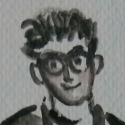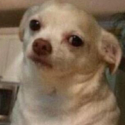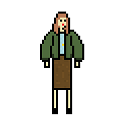What are you reading today/book club
Re: What are you reading today/book club
Now that debate is over for the time I've been attempting to switch off critical/research works and into casual works
I read Metamorphosis it was gr8
Starting to read Short stories, so if you could recommend them to me that would be awesome
Also any classics that I should prioritize? Was starting with 100 years of Solitude
I read Metamorphosis it was gr8
Starting to read Short stories, so if you could recommend them to me that would be awesome
Also any classics that I should prioritize? Was starting with 100 years of Solitude
- 4
-

Cowboy - Posts: 579
- Joined: Tue Feb 24, 2015 3:11 pm
- Location: Austin
- Reputation: 2342
Re: What are you reading today/book club
continue with kafka's short stories, anywhere else you go will be downhill, bad copy of a bad copy (haruki, i'm talking bout u blud).
some of the very short ones are amazing, people often don't realise how funny they are. this, for example:
https://livelongday.files.wordpress.com ... dradek.pdf
some of the very short ones are amazing, people often don't realise how funny they are. this, for example:
https://livelongday.files.wordpress.com ... dradek.pdf
- 3
-

pirxthepilot - Posts: 507
- Joined: Wed Jul 23, 2014 7:26 am
- Reputation: 2022
Re: What are you reading today/book club
I reckon Borges is as good as Kafka, if not a bit better. Certainly more polished. Might as well read everything both of them have written though.
Bit from Dave Foster Wallace explaining how funny kafka is here: http://harpers.org/wp-content/uploads/H ... 059612.pdf
Personally if I had my time again I'd like to have read more books written by women. It's to my permanent chagrin that most of the books I've read are the same books that all the other irritating young men have read. To that end I'd stay away from Hemmingway, Bukowski and The Beats. Maybe check in on them when you're older.
Bit from Dave Foster Wallace explaining how funny kafka is here: http://harpers.org/wp-content/uploads/H ... 059612.pdf
Personally if I had my time again I'd like to have read more books written by women. It's to my permanent chagrin that most of the books I've read are the same books that all the other irritating young men have read. To that end I'd stay away from Hemmingway, Bukowski and The Beats. Maybe check in on them when you're older.
- 4

-

bels - Yung Winona
- Posts: 5087
- Joined: Thu Jul 11, 2013 2:43 pm
- Reputation: 18872
Re: What are you reading today/book club
i just mentioned the humour as an aside. anyway i'll see your standard hipster foster wallace and raise you judith butler. this is great:
https://www.youtube.com/watch?v=v573KaWGIrc
srsly wtf on borges 'as good as kafka'. in his better-known works borges has basically one trick: parachuting an idea from zenoberkeley, swift into an apparently 'straight' chesterton-style narrative. (also, you talk about me using too many REFERENCES???). of course he does this incredibly well and follows it through. but it gets tiresome. no question he is a very over-rated writer. (i actually prefer later stuff like 'the south').
https://www.youtube.com/watch?v=v573KaWGIrc
srsly wtf on borges 'as good as kafka'. in his better-known works borges has basically one trick: parachuting an idea from zenoberkeley, swift into an apparently 'straight' chesterton-style narrative. (also, you talk about me using too many REFERENCES???). of course he does this incredibly well and follows it through. but it gets tiresome. no question he is a very over-rated writer. (i actually prefer later stuff like 'the south').
- 1
-

pirxthepilot - Posts: 507
- Joined: Wed Jul 23, 2014 7:26 am
- Reputation: 2022
Re: What are you reading today/book club
I don't recall Kafka doing anything that much different to what you describe Borges as doing. It has been a while since I read anything closely though.
My main issue with him is when I was reading him I remember frequently feeling like I was sifting through juvenelia or incomplete works. Maybe it's just his status that means so much of his work has been dug up but for every excellent piece there was another that seemed a waste of time. The quality of output on Borges just seemed overall better. Don't think I'd say he's overrated though at this point his ideas do seem to be very saturated into the modern zeitgeist. I still enjoy the settings and the vibes of them though.
I feel these are pretty pointless quibbles and we'd probably both agree they're very good authors and worthy of study.
My main issue with him is when I was reading him I remember frequently feeling like I was sifting through juvenelia or incomplete works. Maybe it's just his status that means so much of his work has been dug up but for every excellent piece there was another that seemed a waste of time. The quality of output on Borges just seemed overall better. Don't think I'd say he's overrated though at this point his ideas do seem to be very saturated into the modern zeitgeist. I still enjoy the settings and the vibes of them though.
I feel these are pretty pointless quibbles and we'd probably both agree they're very good authors and worthy of study.
- 1

-

bels - Yung Winona
- Posts: 5087
- Joined: Thu Jul 11, 2013 2:43 pm
- Reputation: 18872
Re: What are you reading today/book club
- 0
“clothing for attractive rich people in their 20s to go to weddings in” — Zack Johnson on Vineyard Vines
-

adiabatic - Posts: 301
- Joined: Tue Mar 31, 2015 12:10 pm
- Reputation: 374
Re: What are you reading today/book club
The Nook service has gone out of business or something so now I have to buy ebooks from Sainsburys or something and then jump through some fucking hoops to sideload them onto my nook. I have to install Adobe Digital Editions or something.
Is there some kind of ebook webstore which will just sell me access to like .epub files? I can drag and drop them on board and it all works fine.Or are ebooks still locked in DRM hell? I don't really want to buy a kindle because iliam will side eye me for it but I'm too bourgeois to display books in my home so IDK what else I can do.
Is there some kind of ebook webstore which will just sell me access to like .epub files? I can drag and drop them on board and it all works fine.Or are ebooks still locked in DRM hell? I don't really want to buy a kindle because iliam will side eye me for it but I'm too bourgeois to display books in my home so IDK what else I can do.
- 1

-

bels - Yung Winona
- Posts: 5087
- Joined: Thu Jul 11, 2013 2:43 pm
- Reputation: 18872
Re: What are you reading today/book club
I've stopped thinking about highrize so I'm going to post my thoughts and discussion points here. Feel free to discuss freely except pirx who isn't allowed to reference anything.
Is high rise about architecture or not about architecture?
I'd be interested in hearing:
Someone comment on the women of the novel,
A psychoanalytic reading (the high rise as a psyche)
Someone who knows about Courbousier saying some basic Courbousier shit that might be relevant.
Is Wilder's camera a substitute for the gun he finally obtains, or is the gun a substitute for a camera? It's mentioned that the higher he climbs in the high rise the less people are impressed or interested in the camera. "Television is for watching, Wilder" Wilder begins trying to make a film of the high rise and through that medium, seeks to dominate or understand it. Does he succeed? Does this have any relation to the almost universal attempts by humans to process pain through creativity? Is he forced to do this because the unnatural environment of the high-rise thwarts any attempt to process pain through pantheism/middle brow escape to nature. An escape into nature is an escape from yourself into hedonism/nihilistic acknowledgement of your insignificance. An escape into art is the reverse, retreating further into yourself and your own significance.
Broken window theory
"That’s what’s coming. That’s why the suburbs interest me because you see that coming. Where one’s almost got to get up in the morning and make a resolution to perform some sort of deviant or antisocial act, some perverse act, even if it’s just sort of kicking the dog, in order to establish one’s own freedom.”"
Is there a need for primitive spaces to act out our violence's? Wilder was a rugby player, does the lack of combat sport drive him to act as he does? Are computer games what save us all from acting out our violent fantasies?
Is Royal correct? Was the high rise his zoo?
Wilder and Royal have Dickensian aptonyms, do other characters?
The only animals ever mentioned are dogs, cats and seaguls. There are no rodents or pests despite the unsanitary conditions of the high rise. Why?
Do the tenants protect the high rise from outside interference (Police, building inspectors) for a reason outside of narrative coherence?
Is high rise about architecture or not about architecture?
I'd be interested in hearing:
Someone comment on the women of the novel,
A psychoanalytic reading (the high rise as a psyche)
Someone who knows about Courbousier saying some basic Courbousier shit that might be relevant.
Is Wilder's camera a substitute for the gun he finally obtains, or is the gun a substitute for a camera? It's mentioned that the higher he climbs in the high rise the less people are impressed or interested in the camera. "Television is for watching, Wilder" Wilder begins trying to make a film of the high rise and through that medium, seeks to dominate or understand it. Does he succeed? Does this have any relation to the almost universal attempts by humans to process pain through creativity? Is he forced to do this because the unnatural environment of the high-rise thwarts any attempt to process pain through pantheism/middle brow escape to nature. An escape into nature is an escape from yourself into hedonism/nihilistic acknowledgement of your insignificance. An escape into art is the reverse, retreating further into yourself and your own significance.
Broken window theory
"That’s what’s coming. That’s why the suburbs interest me because you see that coming. Where one’s almost got to get up in the morning and make a resolution to perform some sort of deviant or antisocial act, some perverse act, even if it’s just sort of kicking the dog, in order to establish one’s own freedom.”"
Is there a need for primitive spaces to act out our violence's? Wilder was a rugby player, does the lack of combat sport drive him to act as he does? Are computer games what save us all from acting out our violent fantasies?
Is Royal correct? Was the high rise his zoo?
Wilder and Royal have Dickensian aptonyms, do other characters?
The only animals ever mentioned are dogs, cats and seaguls. There are no rodents or pests despite the unsanitary conditions of the high rise. Why?
Do the tenants protect the high rise from outside interference (Police, building inspectors) for a reason outside of narrative coherence?
- 3

-

bels - Yung Winona
- Posts: 5087
- Joined: Thu Jul 11, 2013 2:43 pm
- Reputation: 18872
Re: What are you reading today/book club
I'm just starting to read Naked Lunch by William Burroughs. I've read Queer and seen the film version of Naked Lunch, so I'm not totally in the dark about what to expect.
- 0
-

dakaf_fal - Posts: 92
- Joined: Sun Oct 18, 2015 10:13 am
- Location: Birdland
- Reputation: 369
Re: What are you reading today/book club
Pirx an aptonym is a name that is also part of the character ie Wilder is "wild" Royal is like a king etc
- 0

-

bels - Yung Winona
- Posts: 5087
- Joined: Thu Jul 11, 2013 2:43 pm
- Reputation: 18872
Re: What are you reading today/book club
right i know that now, it was the weird latin/greek hybridization that threw me. can we agree that if i'm not allowed to mention hegel however appropriate the context you're not allowed to use fugly neologisms
- 0
-

pirxthepilot - Posts: 507
- Joined: Wed Jul 23, 2014 7:26 am
- Reputation: 2022
Re: What are you reading today/book club
There's no such thing as objective aesthetics in neologisms pirx.
- 1

-

bels - Yung Winona
- Posts: 5087
- Joined: Thu Jul 11, 2013 2:43 pm
- Reputation: 18872
Re: What are you reading today/book club
Somebody please comment. Pirx I'll even let you make one reference as long as you fully explain it to those of us who aren't familiar with the canon
- 0

-

bels - Yung Winona
- Posts: 5087
- Joined: Thu Jul 11, 2013 2:43 pm
- Reputation: 18872
Re: What are you reading today/book club
I have ordered it from abebooks but it's going to take 1-2 weeks to arrive (Abe is a busy man you know)
- 2

- oucho
- Posts: 508
- Joined: Thu Mar 27, 2014 5:34 pm
- Reputation: 3714
Re: What are you reading today/book club
Currently reading /Letters to a Young Poet/.
I was pretty turned off by Bukowski's /Love is a Dog From Hell/. It felt like a drudgery to get through.
Really enjoyed Diaz' /This is How You Lose Her/, he's become increasingly interesting the more I learn about him. Very jealous of anyone who gets to be in an academic community like one at MIT.
Taking book rec's for the summer. I'd love some beat flaxy kind of stuff, or any rec's for stuff that people enjoyed reading in the summer.
I was pretty turned off by Bukowski's /Love is a Dog From Hell/. It felt like a drudgery to get through.
Really enjoyed Diaz' /This is How You Lose Her/, he's become increasingly interesting the more I learn about him. Very jealous of anyone who gets to be in an academic community like one at MIT.
Taking book rec's for the summer. I'd love some beat flaxy kind of stuff, or any rec's for stuff that people enjoyed reading in the summer.
- 3
-

JewTurk - Posts: 590
- Joined: Thu May 29, 2014 3:20 am
- Reputation: 1856
Re: What are you reading today/book club
In the midst of reading House of Leaves after years of wanting to read it. also finally picked up Wizard and Glass, i guess i should probably finish The Dark Tower if they're gonna start making movies
it's good if you can get absorbed in the story, the format doesn't really get super wonky until you're at a point where you can make a decision whether to keep reading or not, depending on if your're engaged enough in the story.
it's good if you can get absorbed in the story, the format doesn't really get super wonky until you're at a point where you can make a decision whether to keep reading or not, depending on if your're engaged enough in the story.
- 0
Last edited by MythicSquirrel on Sat Apr 23, 2016 11:49 am, edited 1 time in total.
-

MythicSquirrel - Posts: 18
- Joined: Thu Oct 02, 2014 6:53 pm
- Reputation: 132
Re: What are you reading today/book club
How are you finding it? It's been on my to-read list for probably 2/3 years but I keep going back and forth on whether or not it seems too gimmicky
- 0

-

106-2 - Posts: 130
- Joined: Fri Jun 26, 2015 6:18 pm
- Reputation: 778
Re: What are you reading today/book club
The 3rd Book for the Care-tags Book club will be:
*** The Argonauts *** by ~ Maggie Nelson ~

It's a short read, around 170 pages ~ easily readable in a few days.
There's a of Maggie Nelson to help you decide whether you want to read it (you should).
If you like the The Lover's Discourse by Barthes then you'll probably enjoy this book.
Please post your thoughts, facts and opinions by the 29/5/2016.
If you're going to buy the book, please don't buy from amazon.com or affiliates if you can help it.
Buy from your local independent bookstore if you can afford it (.
*** The Argonauts *** by ~ Maggie Nelson ~

It's a short read, around 170 pages ~ easily readable in a few days.
There's a of Maggie Nelson to help you decide whether you want to read it (you should).
If you like the The Lover's Discourse by Barthes then you'll probably enjoy this book.
Please post your thoughts, facts and opinions by the 29/5/2016.
If you're going to buy the book, please don't buy from amazon.com or affiliates if you can help it.
Buy from your local independent bookstore if you can afford it (.
- 3
-

Iliam - Posts: 284
- Joined: Sat Jul 19, 2014 12:25 am
- Reputation: 1948
Re: What are you reading today/book club
I found an acid-free, 100% postconsumer wastepaper copy at the library.
- 4
-

sknss - 2015 Summer Camp Participant
- Posts: 1443
- Joined: Thu Jul 11, 2013 11:26 am
- Reputation: 6464
Re: What are you reading today/book club
1) didn't make a suggestion, does the Male Voice take priority?
2) this book has a REF-ER-ENCE to deleuze/irigiray etc on every single page, idk how bela and other sensitive types will cope
3) "Please post your thoughts, facts and opinions by the 29/5/2016."
= lol fuck off
2) this book has a REF-ER-ENCE to deleuze/irigiray etc on every single page, idk how bela and other sensitive types will cope
3) "Please post your thoughts, facts and opinions by the 29/5/2016."
= lol fuck off
- 5
-

pirxthepilot - Posts: 507
- Joined: Wed Jul 23, 2014 7:26 am
- Reputation: 2022
Re: What are you reading today/book club
Oh sorry yes ratchet koala's book first. When are we meant to have read it by?
and
I think the book's references are more inclusive than exclusive. A knowledge of the source isn't required to understand their relevance to whatever is being discussed. The quotes take the reader along with them rather than shutting them out by assuming prior knowledge. I'm think bela will be fine.
and
I think the book's references are more inclusive than exclusive. A knowledge of the source isn't required to understand their relevance to whatever is being discussed. The quotes take the reader along with them rather than shutting them out by assuming prior knowledge. I'm think bela will be fine.
- 1
Last edited by Iliam on Mon May 02, 2016 3:43 pm, edited 1 time in total.
-

Iliam - Posts: 284
- Joined: Sat Jul 19, 2014 12:25 am
- Reputation: 1948
Re: What are you reading today/book club
So I read Highrize this weekend. It takes place in a highrise because it's utopian fiction and the highrise, certainly the one in the book, is a utopian ideal, but it's not about architecture? I think part of the idea is to look at the utopian ideals of the highrise and apply that to society. The highrise quickly separates itself into a recognisable upper, middle and lower class, despite the apparent homogeneity of the populace. From there the community continues to travel sociologically backwards in time, splitting into smaller and smaller clans, which are manipulated by the top floors, until eventually there are only tiny groups left whose only objective is survival. At this point the top floors lose their ability to control the situation and Wilder breaks through. This backwards movement through time is also reflected in the steady decrease of the population and resources. Eventually they end up as cavemen and women wearing warpaint and speaking in grunts/birth-cries.
It's only when society has completely collapsed to the point where it has no structure at all that the top floors lose their control over the situation. Is that a comment that the only way to remove a ruling class is to destroy society? By the time this happens in Highrise though there no longer is a ruling class because the men have been overthrown by the women. I think the implication in the book is that society has been driven and formed by men restlessly acting out their inner psychological obsessions on the world. All the 3 main male characters are driven by some deeper psychological obsession: Royal by his feelings of inadequacy wants to prove he can rule the highrise, Wilder comes to see the highrise and Royal as being symbolic of his relationship with his father, Laing is a little less easy to summarize but 'He would build his dwelling-place where he was, with this woman and in this cave in the cliff face.' In the end Wilder and Laing both end up subservient to women. Pangbourne and Steele are both also psychotic.
The occupants play out a brief history of society in reverse so that Ballard can make wider comments of society and the history of society and the role of men and women in society throughout history. But I don't know what the relevance of the development of this in a homogenous group of people is, is he just making the point that humans inevitably arrange themselves in this way and the things that separate us in society now: education, profession, etc. are arbitrary and not fixed?
I wonder if through Wilder's camera Ballard is observing that we use the arts as a way to engage with out deeper psychological obsessions from a distance. Because eventually the situation in the highrise allows Wilder to live what he was trying to capture on film, by climbing the highrise, and eventually discarding his camera for a gun and shooting Royal. We use the arts to skirt around and look at what obsesses us, without truly living it. Ultimately all 3 men seem to reach a certain contentment with their situation.
I feel like there are a lot of other things going on. I don't really understand the references to the highrise as a zoo, or the significance of Royal's birds. I find the most interesting thing to be the way that the community 'collapses' in a way that reflects an unravelling of history. Ultimately it seems to end up in a utopia? The women on the top floors start to redecorate and rebuild the apartments there, the children are playing in the playground again. I feel like the implication of this is that society was formed by psychopathic men who we needed at some point: 'No zoo wold survive for long with Pangbourne as its keeper, but he would provide a node of violence and cruelty that would keep alive in others the will to survive. Let the psychotics take over. They alone understood what was happening.' but no longer need? Basically all men want to do is be cavemen.
It's only when society has completely collapsed to the point where it has no structure at all that the top floors lose their control over the situation. Is that a comment that the only way to remove a ruling class is to destroy society? By the time this happens in Highrise though there no longer is a ruling class because the men have been overthrown by the women. I think the implication in the book is that society has been driven and formed by men restlessly acting out their inner psychological obsessions on the world. All the 3 main male characters are driven by some deeper psychological obsession: Royal by his feelings of inadequacy wants to prove he can rule the highrise, Wilder comes to see the highrise and Royal as being symbolic of his relationship with his father, Laing is a little less easy to summarize but 'He would build his dwelling-place where he was, with this woman and in this cave in the cliff face.' In the end Wilder and Laing both end up subservient to women. Pangbourne and Steele are both also psychotic.
The occupants play out a brief history of society in reverse so that Ballard can make wider comments of society and the history of society and the role of men and women in society throughout history. But I don't know what the relevance of the development of this in a homogenous group of people is, is he just making the point that humans inevitably arrange themselves in this way and the things that separate us in society now: education, profession, etc. are arbitrary and not fixed?
I wonder if through Wilder's camera Ballard is observing that we use the arts as a way to engage with out deeper psychological obsessions from a distance. Because eventually the situation in the highrise allows Wilder to live what he was trying to capture on film, by climbing the highrise, and eventually discarding his camera for a gun and shooting Royal. We use the arts to skirt around and look at what obsesses us, without truly living it. Ultimately all 3 men seem to reach a certain contentment with their situation.
I feel like there are a lot of other things going on. I don't really understand the references to the highrise as a zoo, or the significance of Royal's birds. I find the most interesting thing to be the way that the community 'collapses' in a way that reflects an unravelling of history. Ultimately it seems to end up in a utopia? The women on the top floors start to redecorate and rebuild the apartments there, the children are playing in the playground again. I feel like the implication of this is that society was formed by psychopathic men who we needed at some point: 'No zoo wold survive for long with Pangbourne as its keeper, but he would provide a node of violence and cruelty that would keep alive in others the will to survive. Let the psychotics take over. They alone understood what was happening.' but no longer need? Basically all men want to do is be cavemen.
- 3

- oucho
- Posts: 508
- Joined: Thu Mar 27, 2014 5:34 pm
- Reputation: 3714
Re: What are you reading today/book club
How do you guys go about finding/selecting/discovering new things to read? I've decided to start reading between my classes as I enjoy it so much but I never know what to read?
I checked out and finished Vonnegut's Mother Night today, it's been something that I've been meaning to get around to reading for quite some time now well ever since I finished Slaughterhouse Five. I really enjoyed it as pure entertainment however I need to go back through some parts of it to digest them again. As always though I enjoyed Vonnegut's writing style, this is I think the third book I've written by him. I know I've read Cat's Craddle and Slaughterhouse Five but I can't remember if I've read anything else. I think I might read some more of him after I finish Catch 22 which I checked out today aswell.
I'm also open to suggestions for books, I tend to like things that are similar Vonnegut with the whole dark humor and stuff.
I checked out and finished Vonnegut's Mother Night today, it's been something that I've been meaning to get around to reading for quite some time now well ever since I finished Slaughterhouse Five. I really enjoyed it as pure entertainment however I need to go back through some parts of it to digest them again. As always though I enjoyed Vonnegut's writing style, this is I think the third book I've written by him. I know I've read Cat's Craddle and Slaughterhouse Five but I can't remember if I've read anything else. I think I might read some more of him after I finish Catch 22 which I checked out today aswell.
I'm also open to suggestions for books, I tend to like things that are similar Vonnegut with the whole dark humor and stuff.
- 7
I'll stop wearing black when they invent a darker color.
Check out my shit tumblr.
Also consider checking out my music.
Follow me.
Check out my shit tumblr.
Also consider checking out my music.
Follow me.
-

ASTROCHIMP - Posts: 271
- Joined: Mon Dec 07, 2015 1:10 am
- Location: Space or Wisconsin...
- Reputation: 1360
Re: What are you reading today/book club
I READ IT. IT WAS GOOD. I LIKED IT.
It was not a self help book but it made me feel better that someone else goes through the same sort of worries sometimes.
It was not a self help book but it made me feel better that someone else goes through the same sort of worries sometimes.
- 2
"Let's be vagabonds." - Yohji Yamamoto
-

rjbman - Posts: 1560
- Joined: Sun Sep 29, 2013 11:34 pm
- Location: CO
- Reputation: 6846
Who is online
Users browsing this forum: No registered users and 11 guests
